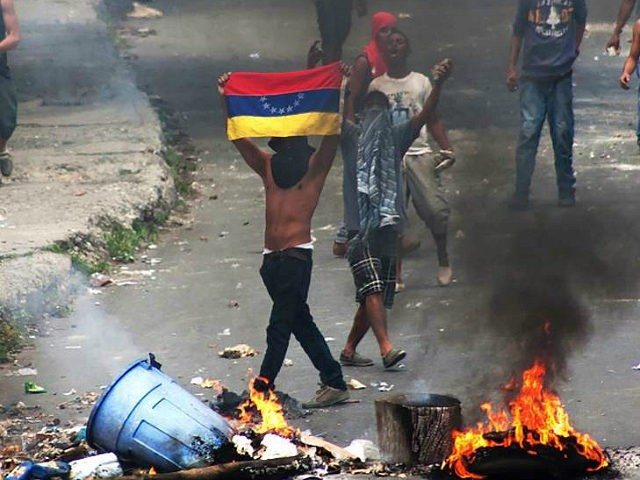China appears to be souring on the decision to invest heavily in Venezuela, now arguably the world’s worst economy, with its state media suggesting Wednesday that keeping commitments to Venezuela “is at the cost of great risk” and the nation’s banks should reconsider business there.
China developed close ties to the socialist regime of late dictator Hugo Chávez which persist to this day. Favorable loans from Beijing have helped keep the plummeting economy under current dictator Nicolás Maduro afloat.
China’s state-run Global Times suggested in two articles Wednesday that this relationship was no longer profitable for China. While adding the caveat that “it is impossible for China to pull out” and “Latin America should not be seen as the frontier of China’s influence,” the Times warned that Venezuela’s downward spiral “may impact China severely.”
“For a long time, Venezuela has been a hot investment destination in South America for Chinese firms. The country’s economy and social unrest exposes China’s commercial interests to huge risks. If a civil war really breaks out in Venezuela, then those Chinese business interests will be gone,” the Times warns.
The state newspaper estimates that China’s state banks “have offered 17 batches of loans worth $65 billion in total to Venezuela in terms of oil refining, gold mining, logistics, trade and railways projects,” and it notes that the Chinese state is “the country’s biggest creditor.” This number coincides with independent estimates that put the figure at $63 billion between 2007 and 2013. China has allowed Venezuela to pay this debt back with oil, given the nation’s vast oil reserves, but the bolívar and oil prices have fallen so far that Foreign Policy estimates Venezuela “must now ship two barrels of oil for every one it originally agreed to” before 2014.
A separate Global Times article suggests that Beijing should view Venezuela as a cautionary tale regarding its longstanding policy to invest heavily in underdeveloped leftist countries. While Venezuela was certainly not an underdeveloped country before Hugo Chávez – on the contrary, it was the wealthiest country in Latin America – socialism has collapsed its economy and left its society without access to food goods, medicine, hygienic products, and other basic products. The Times essentially implores Beijing to be more careful in its next ventures.
“Projects in political risky and unstable countries could present unexpected challenges. Abrupt deterioration of the political situations in these countries could easily turn investments into bad loans,” the column reads. “Therefore, security threats in certain parts of the world should be considered thoroughly before investment is made in these areas.”
“In the case of Venezuela … the situation in the South American country would be of less concern if Chinese regulators had conducted a thorough evaluation of the risk involved in continuing to put money into the country and issued investment warnings accordingly,” it suggests.
The alarmist tone of the Global Times Wednesday is a stark shift from even last week when a column in the state newspaper appeared to excuse Venezuela for its own woes. “Without a fully developed industrialization, Latin American economies depend heavily on resources. Many countries are mired in problems, such as sharp wealth gaps and social rifts, yet the political system they adopted from the West has failed to address these problems,” a column dated August 1 reads.
Unlike its state media, which often provides a more candid view of the Chinese government’s perception of world affairs, the Foreign Ministry has remained supportive of the Venezuelan regime. Claiming to adhere to “non-intervention,” the Chinese Foreign Ministry issued a statement congratulating Maduro for hosting proven fraudulent elections on July 30.
“China believes that the Venezuelan government and people have the ability to properly handle their internal affairs. A stable developing Venezuela accords with all sides interests,” the ministry said. “We sincerely hope that all sides in Venezuela can orderly resolve the relevant issue with peaceful dialogue within a legal framework, and protect the country’s stability and socio-economic development.”
Less than a year ago, Chinese President Xi Jinping visited Peru for the Asia-Pacific Economic Cooperation (APEC) Economic Leaders’ Meeting, looking for more investment opportunities in the region.
In the 2000s – the heyday of Chávez and leftist leaders like Brazil’s Lula da Silva and Argentina’s Cristina Fernández de Kirchner – the atmosphere on the continent was significantly more favorable towards communist Chinese investment. Even much later in 2013, following Chávez’s death, China pledged full commitment to an alliance with Maduro. Maduro, in turn, promised a “new geopolitics” featuring a “multipolar, balanced world,” suggesting a world where China eclipsed the United States in influence.

COMMENTS
Please let us know if you're having issues with commenting.